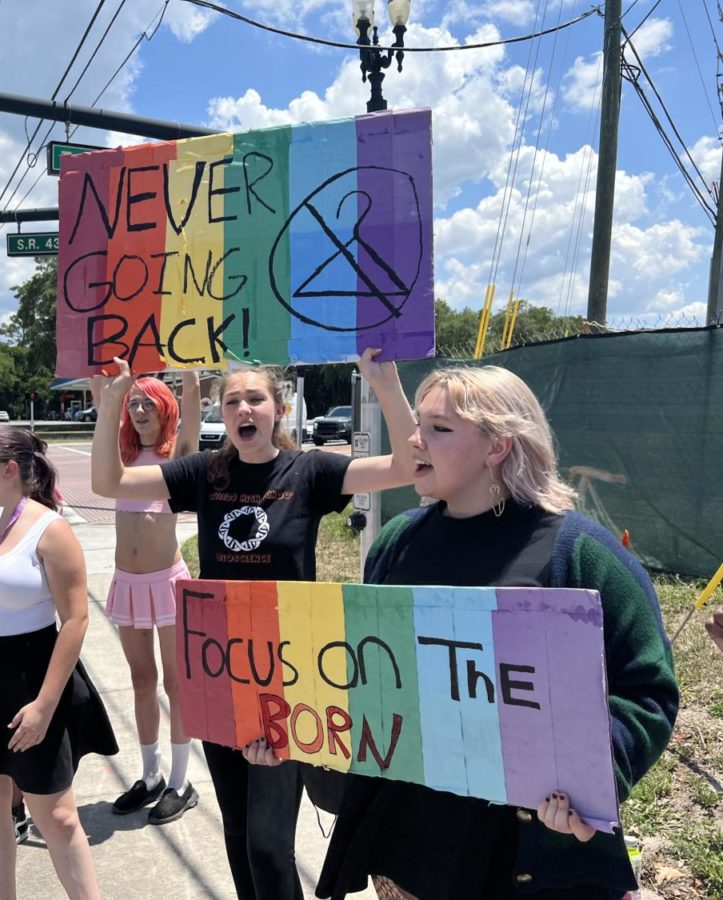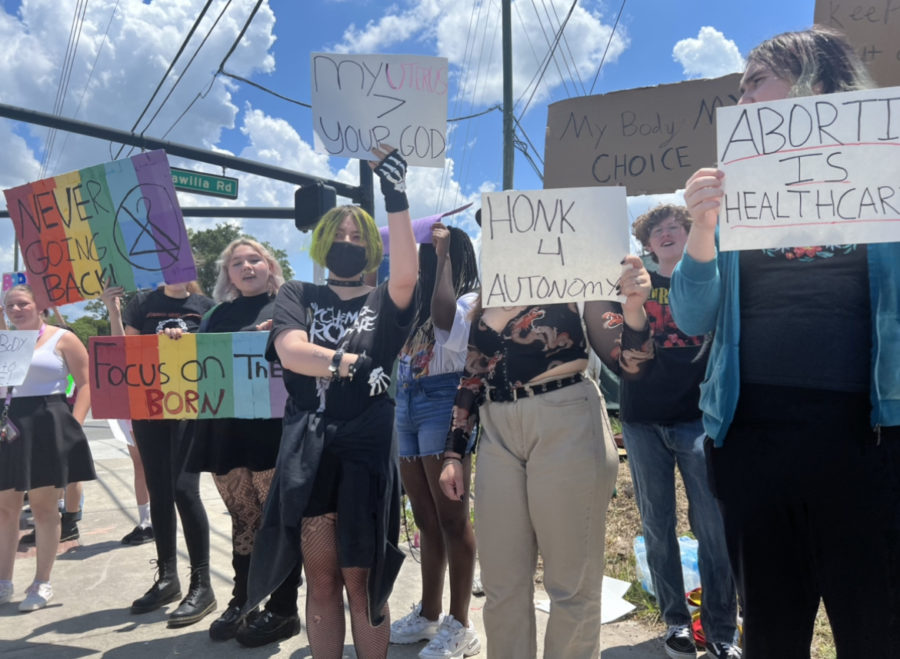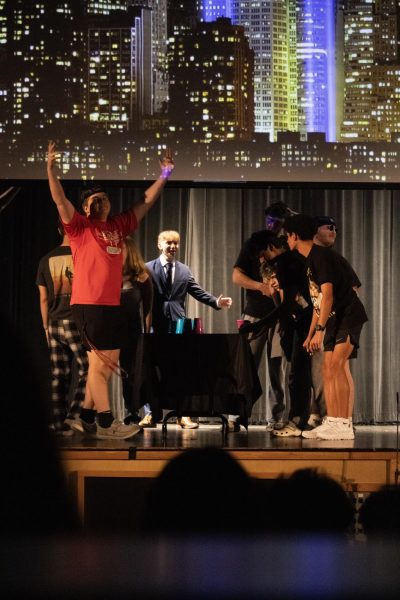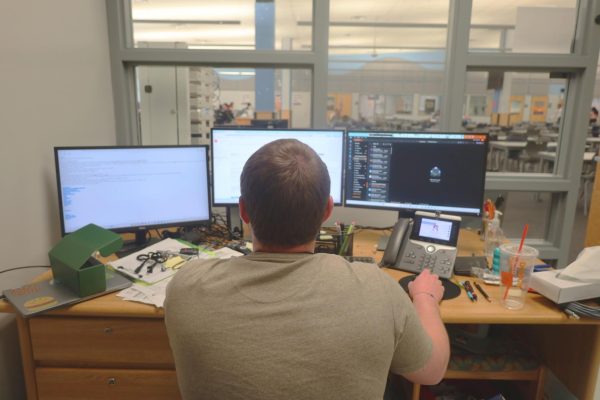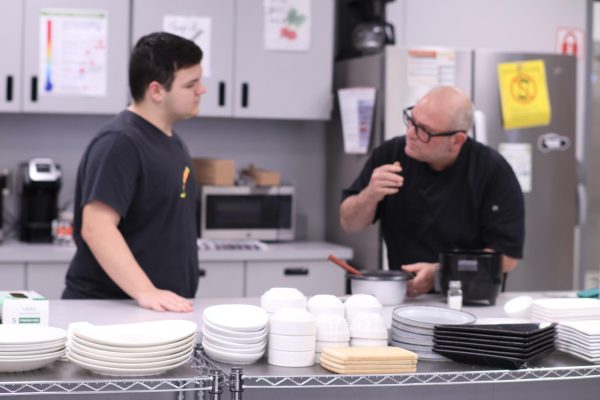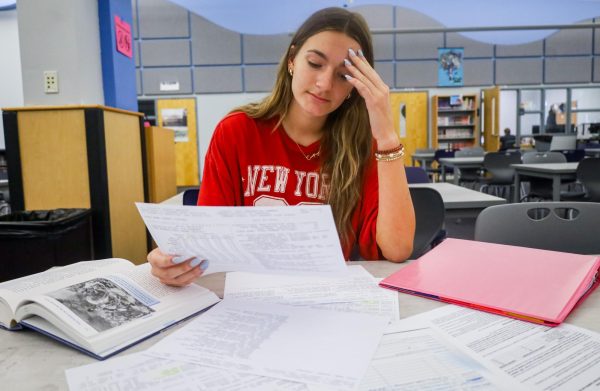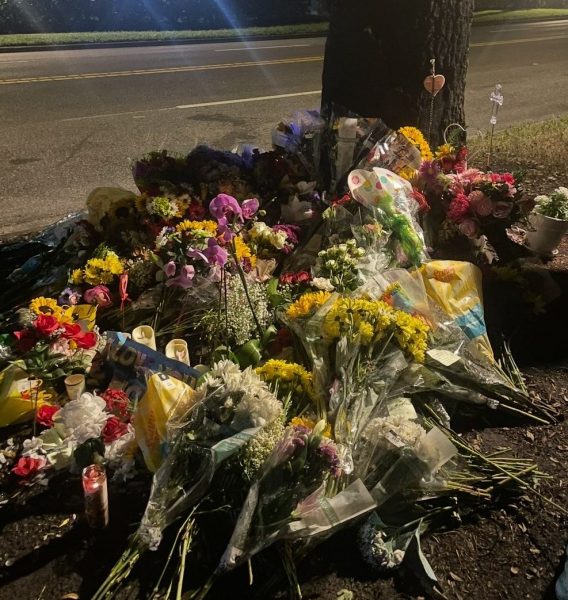Pro-choice students protest Roe v. Wade overturn
photo by Skyler Glenn
Winter Springs sophomore Amy Brewster and Oviedo sophomore Ella Pilacek chant “My body, my choice” at the Tuskawilla protest. Brewster organized this protest following the leak of a Supreme Court draft opinion that suggests the overturn of Roe v. Wade.
When Winter Springs sophomore Amy Brewster heard that the leaked Supreme Court draft opinion suggested the overturn of Roe v. Wade, she knew she had to do something. Outraged, Brewster independently organized a protest to show support for the right to abortion. On May 14, nearly 400 protests were held across the nation in response to the leak, including two protests held locally, the one organized by Brewster on Tuskawilla Road and one at the Orlando City Hall.
“As a woman, I felt that being silent wasn’t an option,” Brewster said.
Roughly 25 students attended the Tuskawilla protest from 1:30 to 3 p.m., including juniors Cat Bunn and Ciara Bibbs. A majority of the protesters brought signs and wore pro-choice clothing, such as Bunn, whose sign included phrases like “Keep your laws off my body” and “My body. My choice.”
“I wanted to make my voice heard and spread awareness for this issue,” Bunn said. “I believe that [everyone] should be able to have a choice. If you don’t like abortions, don’t have one.”
The Orlando City Hall protest was held from 5 to 7 p.m., and over 100 people attended. The protest was so lively that the police department shut down surrounding roads, according to senior Tessa Monroe, who participated in the event.
“There was an atmosphere of determination,” Monroe said. “I felt like it was important to show my support publicly and unapologetically.”
The 1973 Roe v. Wade decision deemed abortions constitutional by the Due Process Clause in the Fourteenth Amendment, which guarantees citizens the right to privacy. Now, with a Conservative majority in the Supreme Court, the decision seems likely to be overturned. In the leaked draft, Justice Samuel Alito wrote that “Roe was egregiously wrong from the start” and “its reasoning was exceptionally weak.” If overturned, states will once again have the power to make abortions illegal, with no exceptions for rape, incest or life-threatening pregnancies.
States like Texas and Oklahoma currently have the most severe restrictions on abortions, making the procedure illegal after six weeks. Even more states have already established “trigger laws” that will ban abortions as soon as the overturn is complete. According to the Guttmacher Institute, 26 states are certain or likely to ban abortions as a result, including Florida. Pro-choicers like Monroe feel that this will not ban all abortions – it will only ban safe abortions.
“People will find a way to terminate an unwanted pregnancy whether it’s legal or not,” Monroe said. “This overturning will kill people.”
Pro-choicers also worry that a ban on abortion will lead to other bans that could harm women and the LGBTQ+ community. Supreme Court case Obergefell v. Hodges, which legalized gay marriage, was also deemed constitutional by the Due Process Clause of the Fourteenth Amendment. For this reason, overturning Roe could take away rights from more minorities, according to Oviedo sophomore Ella Pilacek, who attended the Tuskawilla protest.
“Realistically, it’s not just about abortion,” Pilacek said. “The only thing we can do is make it clear that this will not be accepted quietly.”
Because abortion laws will ultimately be up to the states after the overturn, Monroe encourages all people to contact their local legislatures to protect the rights of all people with a uterus.
“Call your governor, your representative, your Congressperson, even your mayor,” Monroe said. “If a delegate does not support the right to a safe abortion, then the next step is to vote them out.”
Your donation will support the student journalists of Hagerty High School. We are an ad-free publication, and your contribution helps us publish six issues of the BluePrint and cover our annual website hosting costs. Thank you so much!

